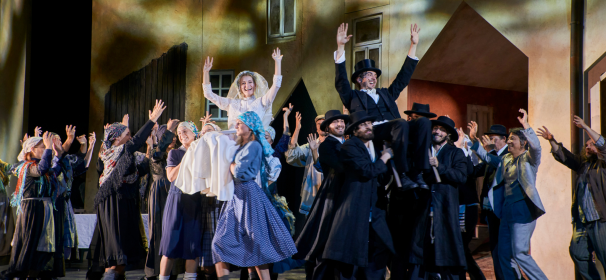In 1905, the milkman Tevye, his wife Golde and their five daughters live in the Russian-Ukrainian shtetl1 Anatevka. Tevye finds stability in his faith, in Jewish traditions and in rituals, because the world is unstable enough: the coexistence of Jews and Christians is increasingly marred by violence and pogroms.
Act 1
Golde learns from the matchmaker Yente that the rich butcher Lazar Wolf is interested in her eldest daughter Tzeitel. Tzeitel and her sisters Hodel and Chava are sceptical as to whether Yente can help them find a happy marriage.
Because Tevye’s horse is lame, he has to pull his cart himself; sometimes he wishes he were a rich man who could lead a more comfortable life… For the Sabbath he brings home a guest: Perchik, a student with revolutionary views, who is there to tutor the two youngest daughters, Shprintze and Bielke.
At Golde’s request, Tevye meets with Lazar Wolf and they agree on Lazar’s marriage to Tzeitel. The engagement is celebrated with exuberance at the inn. But when Tevye congratulates Tzeitel on her future husband the next morning, she is beside herself because she loves Motel the tailor. Tevye is finally persuaded to give them his blessing. Golde also accepts Motel when Tevye tells her about a dream he claims to have had: Golde’s deceased grandmother Tzeitel and Lazar’s first wife Fruma-Sarah had predicted to him the right path for their eldest daughter.
Tzeitel and Motel are married at a wedding celebration in accordance with Jewish tradition. The joyous celebration is interrupted by the arrival of a Constable with some Russian soldiers, who ransack the party venue.
Act 2
Tevye’s daughter Hodel also has her own ideas about whom she wants to marry: she accepts a proposal from Perchik. Tevye is initially taken aback by her wilfulness, but then accepts her decision. Together with Golde, he looks back on their 25-year marriage.
News spreads in Anatevka that Perchik has been arrested in Kyiv. Hodel sets off for Siberia so that she can be close to him in his exile. When Chava secretly marries the Russian Fyedka, who is not Jewish, Tevye despairs: his daughter’s decision betrays all his convictions; she is dead to him.
The Constable announces that all the Jewish inhabitants must leave the shtetl within three days, on the Tsar’s orders. Full of sadness and melancholy, the Jews say goodbye to Anatevka, their home, and prepare to emigrate. Tevye, Golde and the two youngest daughters move to New York.




